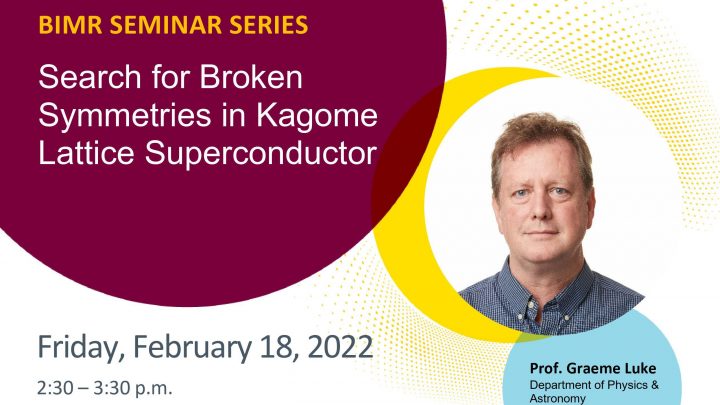Search for Broken Symmetries in Kagome Lattice Superconductor
Feb 18, 2022
2:30PM to 3:30PM

Date/Time
Date(s) - 18/02/2022
2:30 pm - 3:30 pm
Categories
The Kagome lattice contains atoms arranged in a pattern of triangles on the corners of triangles. Magnetic ions in a kagome arrangement have been intensely studied due to the presence of geometrically frustrated magnetism which has lead to a variety of exotic ground states, including spin liquids. Kagome metals have recently received considerable attention, especially since the discovery of superconductivity in AV3Sb5 (where A=K, Cs, Rb). Theoretical calculations indicate that this family of materials has a non-trivial topological band structure, while experiments have demonstrated a variety of phase temperatures such as charge density wave (CDW) order, in addition to superconductivity. I will discuss our muon spin rotation/relaxation studies of pure CsV3Sb5, as well as charge-doped CsV3Sb5-xSnx where we observed multi-gap superconductivity with preserved time-reversal symmetry, but with weak broken time-reversal symmetry in the normal state, distinct from the CDW ordering.
Short bio:
Graeme Luke is a Professor of Physics at McMaster University. He also holds an Affiliated Scientist position at TRIUMF. He received his PhD degree from the University of British Columbia in 1988 and was an NSERC Postdoctoral Fellow at Columbia University. He held Assistant and Associate Professor appointments in the Department of Physics at Columbia University from 1991-1998 before moving to McMaster University in 1998. Prof. Luke’s research interests are in the electronic and magnetic properties of quantum materials, including geometrically frustrated magnetic systems and unconventional superconductors. He is a Fellow of the American Physical Society and was awarded the 2019 Brockhouse Medal by the Canadian Association of Physicists. He was a member of the Canadian Institute for Advanced Research Quantum Materials program from 1999 to 2019 and is presently a member of the TRIUMF Board of Management’s Science Council.

